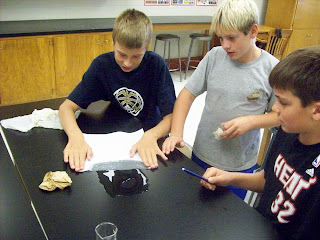As I drank my morning coffee today, I was browsing my Twitter feed; a typical morning ritual for me. Someone I follow had shared an interesting blog post this morning about the problem of incentive programs for getting kids to read. You can read the post
here if you are interested in what got my wheels turning.
I love to read. I try to read--in print, not just pixels--at least half an hour a day, no matter what else is going on, just for the pure pleasure of it. I usually have a novel on my night stand, often I am in the middle of another book or two (often profession-related), I subscribe to a couple of magazines and professional journals...there is a lot of print material close at hand. No one has to give me a star on the sticker chart to get me to read...I just love books.
My kids do too. Sometimes it drives my poor wife crazy: she'll come into the living room where my two kids and I have been reading, and find a dozen books and magazines laying around. My son often is in the middle of at least three or four books all at the same time. (The apple doesn't fall far...) I'd like to think that my kids came to love reading by having parents who love to read.
I do worry a bit though that a teacher might do something to screw this up for them. (Sorry; that sounds pretty nasty, doesn't it?) I'm afraid that they might someday have a teacher who would set up some sort of incentive program to try and get the class to read more, and incidentally squash a their willingness to pick up a book to read it just for pleasure.
Does that sound counter-intuitive? That giving kids a reward for reading a book might actually make them want to read less?
I've seen it happen.
In my most recent position in a school, I served as Technology Coordinator. My office was adjacent to the school library. When classes would come in to look for books, I often would stroll out and talk with the kids about what they were reading, and offer suggestions of some of my favorites as well. (For a techie, I sure do like the ol' printed page!)
And while I could often "sell" a favorite book to an interested reader, there were some times where there was no hope.
I want you to picture the scene: there I was, with a knot of six or seven 5th graders, standing by the stacks. I'm trying to get to know their preferences for genres, their reading level.
"Historical fiction you say? You want a shorter chapter book? Hmmmm... Oh, here's a great one!
Twenty and Ten is of my favorites!"
I gave them just enough of the plot: the twenty kids living in an orphanage in Nazi-occupied France decide to take in ten Jewish kids and share their rations with them to keep them alive. They have to hide the fugitives, and when the nun who runs the orphanage is detained in town, they have to fend for themselves when the Nazis come looking for the Jews.
I had them hooked, and they were actually arguing over who would get to read the book first!
So I hand to book to the first kid. She flips through it, looking at the size of the text on the page, reading a passage here or there...and deciding it might be just the right book for her.
(Yes! Success!)
And then...she closes the book, and turns it over to check the spine.
"Oh, thanks anyway, Mr. Mulder...but there's no orange dot. Sorry. Anybody else want it?"
The rest of the kids agree: "Nope. Need an orange dot. Gotta get some points." And so they moved on, leaving the book in my hand about which they had been so excited just seconds before.
Bizarre? Yes...but not really. You see, our 5th and 6th graders were using Accelerated Reader to track reading--awarding "points" for the number of books read, and the scores on computerized comprehension quizzes. All the books for which the kids could take an AR quiz were marked with an orange dot on the spine. And there were a lot of orange dots...but not on every book. And so this became the acid test: "even if someone recommends a book to me, and it sounds like a book I'd really enjoy...if it doesn't have an orange dot, I'm not going to take it."
An amazing book choice, left on the shelf. A book they were excited about, a book they would have passed around and talked about and learned some important lessons of human kindness and courage in the face of incredible danger. A book-love that could have been, for want of an orange dot.
Killing a love of reading.


